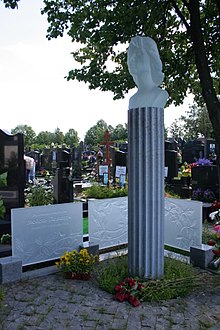Lyubov Grigoryevna Polishchuk

Lyubov Polishchuk ( Russian Любовь Григорьевна Полищук ., Scientific transliteration Ljubov 'Grigor'evna Poliščuk * 21st May 1949 in Omsk ( Siberia ); † 28. November 2006 in Moscow ) was a Russian theater - and movie - actress .
biography
Lyubow Polishchuk was born in 1949 in Omsk, Siberia, as the daughter of a construction worker and a seamstress. Paternal comes Polishchuk of Don Cossacks from. Even in childhood, she dreamed of becoming an actress. She loved dancing and singing to it. She applied for a place in the ballet school, but was not accepted because she was too big. She then joined the school choir, where she promptly became a soloist .
After graduating from school, Lyubov Politschchuk went to Moscow to enroll at the theater institute, but missed the appointment for the aptitude test. When she returned to Omsk, she worked in the Omsk Philharmonic for the ensemble “The Omskers in the Estrade”. Together with this ensemble moved to the All-Russian Master School of Estradenkunst in Moscow.
In 1967 she graduated from the master school and married Valery Makarov, her colleague from the ensemble, and returned to her hometown of Omsk. The marriage resulted in son Alexei Makarov (* 1972). In 1976, Polishchuk divorced her husband because he had a drinking problem. In Omsk, Polishchuk performed as a solo entertainer at the theater.
1976, shortly after divorcing her husband, she was called by the former director of the Omsk Philharmonic, who received a promotion and was summoned to Moscow in the Soviet capital, where she starred in the famous film version of The Twelve Chairs directed by Mark Sakharov . For Polishchuk, this was the personal breakthrough that made her famous across the country and beyond.
The success had a bitter aftertaste, however, because the Soviet leadership found the face of the actress Polishchuk to be "non-Soviet" and forbade her to play any other leading roles in films. Therefore, from now on, the actress had to be content with supporting roles, which, however, in no way had a negative effect on her fame in the Soviet Union.
Not easy for Polishchuk in the first few years in Moscow. She rented a small room in town where she had to share a mattress with her young son Alexei.
From 1979 to 1986 she worked at the Moscow Miniature Theater, today's Moscow Hermitage.
In 1984 she married a second time, namely the Armenian-born actor Sergei Zigal, from whom she became pregnant. Daughter Marijetta was born on October 14, 1984. The marriage was harmonious and happy.
In the same year Polishchuk was named an Honored Artist of the RSFSR .
From 1990 to 1997 Lyubov Polishchuk worked at the "School of Modern Drama" theater under the direction of Iossif Reichelgaus in Moscow. In 1994 she received the high honorary title of People's Artist of the Russian Federation .
Sickness and death
In 2000, Lyubov Polishchuk was involved in a traffic accident in which she was seriously injured in the back and could only perceive her acting appearances with a support corset.
In October 2005 she was hospitalized on an emergency basis, where part of her spine was removed because of a cancer that she had long kept secret from her colleagues and the public. Polishchuk then went to a private clinic in Israel for rehabilitation . When she returned to Moscow in early March 2006, she continued to play her role in the Russian television series My Wonderful Nanny . Your last role.
In the last months of her life, Lyubov Polishchuk was dependent on the most powerful painkillers. Husband Sergei Zigal and son Alexei Makarov visited her regularly at the bedside.
On November 25, 2006, Lyubov Polishchuk was hospitalized because her family members could not wake her in the morning. After treating the hypertensive crisis caused by the painkillers, Polishchuk was discharged from the hospital at his own request.
Lyubov Polishchuk died three days later in her private apartment in central Moscow. She was buried in the Trojekurowo cemetery in section 6a.
Commemoration
On May 26, 2016, a memorial plaque was placed on Bolshoi Kasjonnyj Pereulok No. 8 in Moscow, where Lyubov Polishchuk lived until her death.
Filmography (selection)
- 1979: Exactly that Münchhausen ( Тот самый Мюнхгаузен )
- 1989: Intergirl ( Интердевочка )
- 1995: Schirli-myrli ( Ширли-мырли )
- 1995: Crusader ( Крестоносец )
- 1999: ultimatum ( Ультиматум )
Web links
- Lyubov Polishchuk in the Internet Movie Database (English)
- Original article with photo (Ukrainian)
- Biography, filmography, photo gallery (Russian)
Individual evidence
- ↑ http://7days.ru/stars/bio/lyubov-polishchuk.htm#bio
- ↑ http://sobesednik.ru/kultura-i-tv/20170118-mama-lyubovi-polishchuk-posmotrela-na-doch-i-ponyala-ne-zh
- ↑ http://kino-cccp.net/publ/15-1-0-154
- ↑ http://kino-cccp.net/publ/15-1-0-154
| personal data | |
|---|---|
| SURNAME | Polishchuk, Lyubov Grigoryevna |
| ALTERNATIVE NAMES | Poliščuk, Ljubov 'Grigor'evna; Полищук, Любовь Григорьевна (Russian) |
| BRIEF DESCRIPTION | Russian theater and cinema actress |
| DATE OF BIRTH | May 21, 1949 |
| PLACE OF BIRTH | Omsk ( Siberia ) |
| DATE OF DEATH | November 28, 2006 |
| Place of death | Moscow |